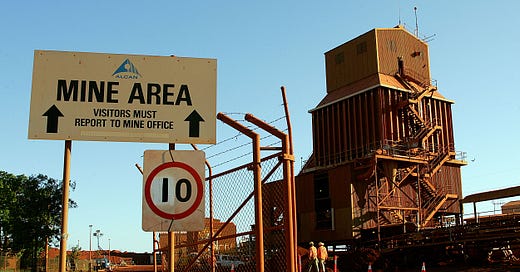TL(PM) DIGEST: Culture war? What culture war?
Plus the ongoing quest for critical minerals, things go from bad to worse in Sudan, and Americans overdoing antidepressants

1. Government leadership and the economy top list of public concerns, with culture war obsessions nowhere to be found
What happened? Gallup released new polling data showing that government leadership and the economy top the list of the most important problems facing the country as named by U.S. adults.
Why does it matter? You wouldn’t know it reading daily press accounts or social media feeds, but most Americans are worried about larger problems related to how the government and economy are being run these days. Big-ticket culture war issues that occupy the minds of political elites in blue and red states—like abortion and transgender issues—don’t even crack the top ten of the country’s most important problems.
TLP’s take: Political activists in both parties remain totally obsessed with cultural battles and trying to force other Americans to accept their own ways of thinking. Leaders of the two major parties would be wise to remember that most Americans don’t care about their elite cultural preoccupations and just want to know what—if anything—political leaders are doing to keep the country and its economy running smoothly.
2. The quest for critical minerals continues
What happened? Two reports in the Washington Post and Financial Times detail the consequences of the new rush for critical minerals needed to make electric vehicles on two nations: Ghana and Germany. Berlin recently reopened a fluorspar mine closed for more than a quarter-century as it seeks to secure its supply chains, while Ghana’s contains some of the world’s bauxite deposits and has seen its exports nearly quintuple since 2015.
Why does it matter? Expanding global demand for these inputs won’t come cheap, with mining companies gobbling up land and building out mining infrastructure in the bauxite-rich Ghanaian region of Boké—much to the displeasure of local residents, who say they’ve received little to no compensation for their losses from Chinese-dominated corporate consortiums. Germany’s move to reopen a once-shuttered mine shows that even supposedly post-industrial nations are taking steps unthinkable until recently to ensure steady supplies of critical minerals.
TLP’s take: Global demand for these minerals will only grow as electric vehicle production climbs, and it’s important for residents near existing and potential mines to receive fair compensation for any disruption to their current livelihoods and communities due to mining. But it’s equally important to both ensure the United States and its allies have secure sources of these minerals and avoid a worldwide race to the bottom against Chinese mining companies with few if any environmental or social welfare standards.
3. Sudan goes from bad to worse
What happened? More than 100,000 people have fled Sudan since clashes between the Sudanese military and a paramilitary faction began last month, the United Nations refugee and humanitarian officials reported, with further 334,000 internally displaced inside Sudan itself. These officials estimate that as many as 800,000 Sudanese could flee to neighboring nations by the end of the year if fighting is not brought to an end.
Why does it matter? The last thing the world needs is another humanitarian crisis brought about by a civil war—but with several cease-fires already having failed, it does seem like the world will face yet another such crisis. Making matters even more complicated, ongoing fighting threatens to drag other nations like Egypt into the conflict as they seek to protect and advance their own interests.
TLP’s take: America faces a difficult balancing act in Sudan: as the United States continues to slowly evacuate American citizens and foreign nationals wishing to leave the country, the State Department must try to achieve a lasting cease-fire that heads off what now seems to be an inevitable humanitarian crisis. That will require closer attention to and coordination with American regional partners like Egypt, Saudi Arabia, and the UAE—if for no other reason than to keep these governments from pouring fuel on the fire of Sudan’s internal conflict.
4. Are Americans taking too many pills?
What happened? The Economist examined all available research on the effectiveness of antidepressants finding that while widely overprescribed, in about 15 percent of cases these drugs do genuinely help people.
Why does it matter? For most people, The Economist notes, antidepressants “are only slightly more effective than a placebo,” despite being prescribed to a full 10 percent of adults in Western countries.
However, these averages obscure another reason why doctors prescribe antidepressants so often: patients’ responses to them vary widely. Rather than a bell curve, the distribution of individuals’ results in the BMJ study looked like a plateau, with a modest summit at one end. For the drugs, this peak sat on the side representing large reductions in depression. For the placebo, it landed on the side of small declines…Because doctors cannot predict whether a given patient is among the 15 percent helped by the drugs, the only way to find out is to give them a try.
TLP’s take: Ultimately, doctors and their patients need to determine what is the best treatment for people in particular cases. But as this analysis suggests, government health programs should expect more rigorous empirical findings from the field to support continued widespread antidepressant prescriptions.
Just one more thing…
Canadian singer-songwriter Gordon Lightfoot died at the age of 84 yesterday. Here’s a look at how his iconic six-minute ballad “The Wreck of the Edmund Fitzgerald” stacks up with what we now know of the iron ore boat’s demise—and how the song “turned the tale of the sinking into a modern legend.”







